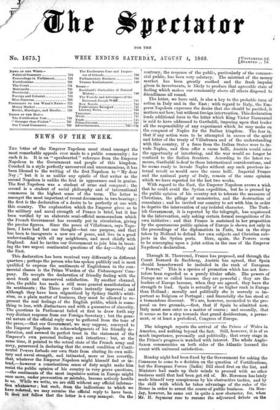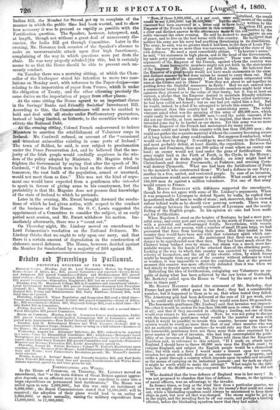Monday night had been fixed by the Government for asking
the Commons to come to a decision on the question of Fortifications, but the European Forces (India) Bill stood first on the list, and Ministers had made up their minds to proceed with no other business until that had been got rid of. Mr. Horsman has lately made himself very conspicuous by his obstructive tactics, and by the skill with which he takes advantage of the rules of the House in order to arrest the course of public business. On Mon- day, however, he came out in quite a new character, for, when Mr. H. Seymour rose to resume the adjourned debate on the Indian Bill, the Member for Stroud got up to complain of the manner in which :the public tine had bees wasttal,. and to slow how necessary it was to proceed as rapidly as possible with the Fortification question. The speaker, however, interposed, and,, at length, though not without a great deal of unnecessary dis- cussion, the India Bill got through Committee. Later in the evening, Mr. Horsman took occasion of the Speaker's absence to make an unwarrantable attack upon that high functionary, complaining of the way in which questions were put fro& the chair. He was very properly rebuked for this, but it certainly seems to us that the House should be able to prevent such un- seemly conduct.
On Tuesday there was a morning sitting, at which the Chan- cellor of the Exchequer stated his intention to move two reso- lutions on Monday next, with reference to the Paper-duties--one relating to the importation of paper from France, which is under the obligation of Treaty, and the other affirming precisely the same duties on the importation of paper from other places.
At the same sitting the House agreed to an important clause in the Savings' Banks and Friendly Societies' Investment Bill. According to this, the Commisssioners will now be enabled to hold and deal with all stocks under Parliamentary guarantees, instead of being limited, as hitherto, to the securities-which con- stitute the National Debt.
At the evening sitting, Colonel French endeavoured to induce Ministers to sanction the establishment of Volunteer corps in Ireland. Mr. Cardwell refused, on account of the "occasional and transient animosities existing in some parts of Ireland." The town of Belfast, he said, is now subject to proclamation under the Peace Preservation Act, and he believed that the ma- jority of the Irish people would cordially acquiesce in the wis- dom of the policy adopted by Ministers. Mr. Maguire tried to frighten the Government by saying that after the speech of Mr. Cardwell, "if the French were to land on the shores of Ireland tomorrow, the vast bulk of the population, armed or unarmed, would not meet them as foes." This was not the kind of argu- ment one would have expected from a gentleman who intended to speak in favour of giving arms to his countrymen, but the probability is that Mr. Maguire does not possess that knowledge of the state of Ireland to which he pretends.
Later in the evening, Mr. Ewart brought forward the resolu- tions of which he had given notice, with respect to the conduct of the business of the House. Sir G. C. Lewis suggested the appointment of a Committee to consider the subject, at an early period next session, and Mr. Ewart withdrew his motion. Im- mediately afterwards, there was a "count out."
On Thursday night, Mr. Lindsay moved an amendment to Lord Palmerston's resolution on the National Defences. Mr. Lindsay thinks that we ought to rely upon our navy, and that there is a certain amount of degradation in the construction of elaborate mural defences. The House, however, decided against the Member for Sunderland by a majority of 268 against 39.



























 Previous page
Previous page